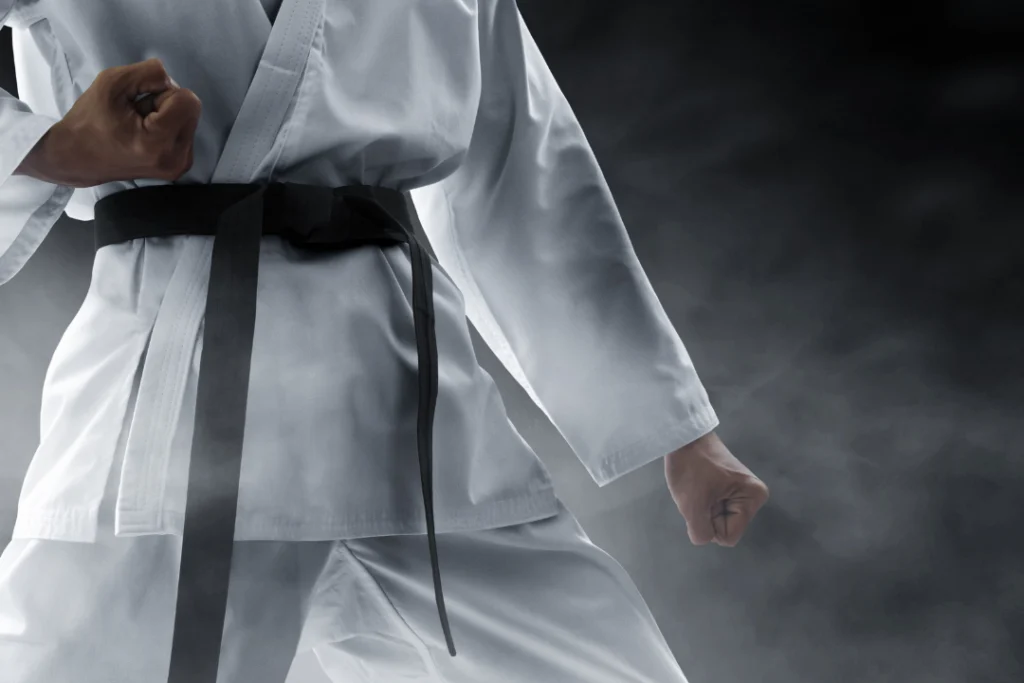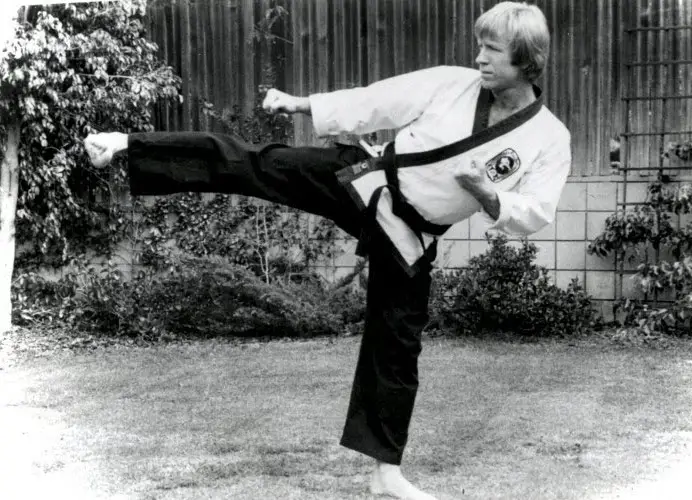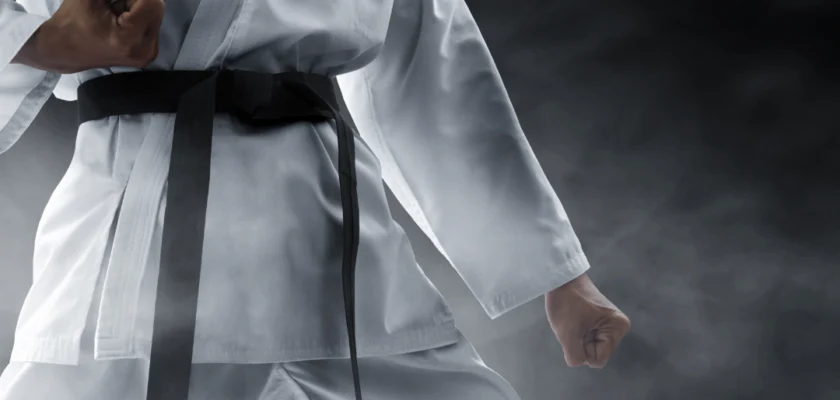Karate is recognized as a practice that enriches cultural and sporting training, and was developed from specific techniques of self-defense and spiritual growth that originated in Okinawa in the 18th century. These techniques were refined and spread throughout Japan at the beginning of the 20th century, creating a legacy that gave rise to some of the best male karatekas of all time.

FOTOKITA/Istock
The word “karate” comes from Japanese and means “empty hands”. This martial art is considered highly scientific, as it efficiently uses all parts of the human body for self-defense. The main objective of karate is the moral improvement of the individual, achieved through intense training and severe discipline, both physical and mental. Karate practitioners, known as karateka, use their hands, arms, legs, feet and other body parts as instruments of defense.
Best male karatekas of all time: the history of karate
Karate has its roots in the Okinawa archipelago, which at the time was part of China, a commercially important region as it permeated Japan’s relations with the country. The Indian monk Bodhidarma arrived there to establish a Buddhist monastery and, in addition to teaching spiritual precepts, introduced a weaponless combat technique focused on health and self-defense, marking the beginning of martial arts in the region.
After the decline of the Ming dynasty, when Japan took control of Okinawa and imposed a ban on the carrying of weapons, interest in karate, which until then had been practiced secretly, increased significantly. At the beginning of the 19th century, this martial art began to be incorporated as part of physical education. Later, in the 1930s, the practice was officially recognized as a martial art by the Japan Martial Arts Association, further consolidating its role and importance in Japanese culture.

Chuck Norris/Archive
Participate in our free community on Whatsapp and receive daily tips, news and curiosities from more than 50 sports! Click here< to join.
Knowing the history of this great Japanese martial art, let’s find out who the best male karatekas of all time are.
Best male karatekas of all time: complete list!
- Kokobun Toshihito
- Takeshi Oishi
- Andy Hug
- Joe Lewis
- Chuck Norris
- Masutatsu Oyama
- Ron Marchini
- Mike Stone
- Mike Warren
- Bill Walace
- Cornel Musat
- Alex Biamonti
- Frank Brennan
- Douglas Brose
- Rafael Aghayev
With these names in mind, how about learning a little more about the history of the best male karatekas of all time?
The story of the best male karatekas of all time
Best male karatekas of all time: Toshihito Kokubun
Born in 1974 in Japan, Toshihito Kokubun began his karate journey when he was just six years old, inspired by his father and older brother. He graduated in Physical Education from the University of Tsukuba. During his career, Kokubun has accumulated several important titles, including WKF world champion in 2000 in the up to 80 kg category and champion at the WKF Asian Championships in 1997 and 2001.
Kokubun was known for his agility, refined technique and combativeness, standing out for his ability to execute quick and precise movements, such as high kicks (jodan mawashi geri) and direct punches (gyaku zuki).
Best male karatekas of all time: Takeshi Oishi
Takeshi Oishi was born on April 19, 1941, in Nagasaki, Japan. From a young age at school, he showed a great passion for kendo. Oishi became one of the JKA’s most respected instructors, and his talent on the mat was indisputable. He was particularly recognized for his exceptional timing and maintained an impressive unbeaten record for more than six years in national and international competitions.
He won the World Kumite title three times and was four times champion of the Nihon Karate Kyokai Japanese Championship (1968, 1969, 1971 and 1973), setting a record that still stands.
Best male karatekas of all time: Andy Hug
Andy Hug, a renowned Swiss fighter, excelled in both Kyokushin Karate and Seidokaikan, winning European and world titles. In addition to his success in traditional martial arts, he shone on the kickboxing scene by winning the K-1 World GP in 1996, cementing his position as one of the sport’s legends.
Hug died prematurely at the age of 35 in Japan from leukemia, leaving an invaluable legacy in the world of fighting. The athlete was nicknamed the “Blue-Eyed Samurai” in the land of the rising sun.
Best male karatekas of all time: Joe Lewis
Joe Lewis gained worldwide fame as one of the most talented and skilled karate fighters the United States has ever produced. Born in 1944, Lewis enlisted in the US Marine Corps at the age of 18 and was assigned to Okinawa, Japan. It was there that he began his studies in Shorin-Ryu karate. After returning to the US, Lewis embarked on a fighting career that lasted 17 years, during which he won several important titles;
He became the first professional karate world champion, the first American heavyweight kickboxing champion and the first professional heavyweight champion in full contact karate. He is often referred to as the “Father of American Kickboxing”.
Best male karatekas of all time: Chuck Norris
Chuck Norris began his martial arts training while serving in the US Air Force in Korea in the 1950s. After his return to the United States, he opened several karate academies and dedicated himself to teaching the art for a number of years. In the 1970s, Norris expanded his horizons by entering the entertainment industry, both in film and television.
In his career in martial arts, Norris has amassed many titles and awards, including the prestigious World Karate Championship in the Middleweight category, which he won in 1968 and successfully defended on five occasions.
Best male karatekas of all time: Ron Marchini
Born in Stockton, California, Ron Marchini found himself immersed in the world of martial arts in 1964. It was in 1968, however, during a trip to Japan, that his career took off. From then until his retirement in 1972, Marchini consistently placed in the top three in karate competitions;
In 1969 and 1970, he reached first place in the Black Belt Magazine list. One of his most famous fights was against Chuck Norris in May 1964, in which Norris emerged victorious by the narrowest of margins.
Best male karatekas of all time: Mike Stone
Born in June 1943 in Hawaii, Mike Stone took his first steps in karate while still in high school, before joining the army. His stay in Okinawa sparked his passion for martial arts. In tournaments, Stone proved unbeatable, winning every individual black belt match and every kata competition he entered. When he retired from competition, Stone had amassed an impressive record of 91 consecutive black belt victories.
In 1971, he was inducted into the Black Belt Hall of Fame for his achievements as a fighter, and again in 1994, this time as an instructor.
Best male karatekas of all time: Mike Warren
At the age of 13, Mike Warren began his karate journey, inspired by his older brother Albert, who was involved in boxing. He received his teachings from renowned martial arts master Ki Whang Kim. Warren developed an aggressive and powerful fighting style, characterized by impressive speed and intricate combinations of techniques.
His reputation grew when he competed in Korean-style tournaments and represented the United States at the 1973 World Taekwondo Championships, winning second place in the heavyweight category. Throughout his career, Warren rose to the rank of Martial Arts Grandmaster, facing and defeating many notable opponents, including Joe Hayes, Bill Wallace and Al Cheeks.
Best male karatekas of all time: Bill Wallace
Born in Portland, Indiana, in 1945, Bill Wallace was one of the first to explore the world of kickboxing. During his high school years, Wallace dedicated himself to fighting and began his studies in judo in 1963, although an injury temporarily interrupted his career in the sport three years later. During his recovery period, Wallace decided to delve deeper into karate.
Throughout his career, Wallace won three titles at the American Karate Championships, three at the USKA Grand Nationals and two at the Top Ten Nationals. His transition to full-contact karate, a precursor to kickboxing, culminated in his becoming PKA World Middleweight Champion in 1974, successfully defending the title on 11 occasions over the next five years.
Best male karatekas of all time: Cornel Musat
Born in Romania, Cornel Musat is an eight-time ITKF world champion and a go-dan black belt (5th dan). His dedication to karate has been evident in his 86 official competitions, where he has amassed an impressive 38 European titles. With more than 35 years in the sport, Musat currently shares his expertise as coach of the national team, focusing on improving refereeing.
His notoriety peaked at the 2012 World Championships in Poland, where he demonstrated not only a solid base, but also impressive speed and exceptional kime.
Best male karatekas of all time: Alex Biamonti
Originally from Provence in France, Alex Biamonti has amassed an impressive collection of medals in international competitions, most notably the gold medal at the prestigious 1998 World Karate Championships in Rio de Janeiro, Brazil.
Renowned for his aggressive approach, Biamonti is known for relentlessly attacking his opponents, demonstrating an impressive volume of fight in every encounter.
Best male karatekas of all time: Frank Brennan
Born in Liverpool on May 6, 1960, Frank Brennan is a renowned Shotokan karateka. His journey in British karate in the 1970s and 1980s led him to win a series of titles both individually and as a member of the KUGB team. His unique skill lies in his versatility, standing out for his dexterity with both hands and feet, often surprising his opponents with dynamic combinations of punches and kicks.
Currently, as well as coaching the England national team, Frank is in high demand as an instructor, both nationally and internationally. With the distinction of 8th Dan, he plays a crucial role as an active member of the KUGB Technical Committee.
Best male karatekas of all time: Douglas Brose
Originally from Cruz Alta, in Rio Grande do Sul, Douglas Brose took his first steps in karate at the age of 7. His impressive list of achievements includes three gold medals in the kumite category up to 60 kg at the World Karate Championships, as well as being a gold medalist at the 2009 World Games and the 2015 Pan American Games. With eight Pan American Karate Championship titles, Brose has consolidated his position as one of the dominant figures in the sport.
Recently retired, he ended his career after his last competition at the Pan American Games in Santiago, Chile, at the end of 2023.
Best male karatekas of all time: Rafael Aghayev
Rafael Aghayev, a renowned karate fighter, was born in Azerbaijan. His career in sport is marked by an impressive list of victories in international competitions. Aghayev has won multiple world titles throughout his career, such as the penta world championship and runner-up medal at the Olympics;
His refined technique, exceptional speed and unwavering determination have made him a legendary figure in the world of karate, showing that he is part of the renowned list of the best male karateka of all time.
Karate, more than a martial art, is a journey of self-discovery and discipline. Over the years, the best male karatekas of all time have transformed this practice into a global spectacle, inspiring thousands of practitioners around the world with their technique, dedication and fighting spirit.
The names highlighted in this text are just a few of the many who have made and continue to make history, showing the richness and diversity of the best male karatekas of all time.
We want to know what you think! Who would you add to the list of the best male karatekas of all time? Leave your comment below and be sure to explore the other articles on our website:



